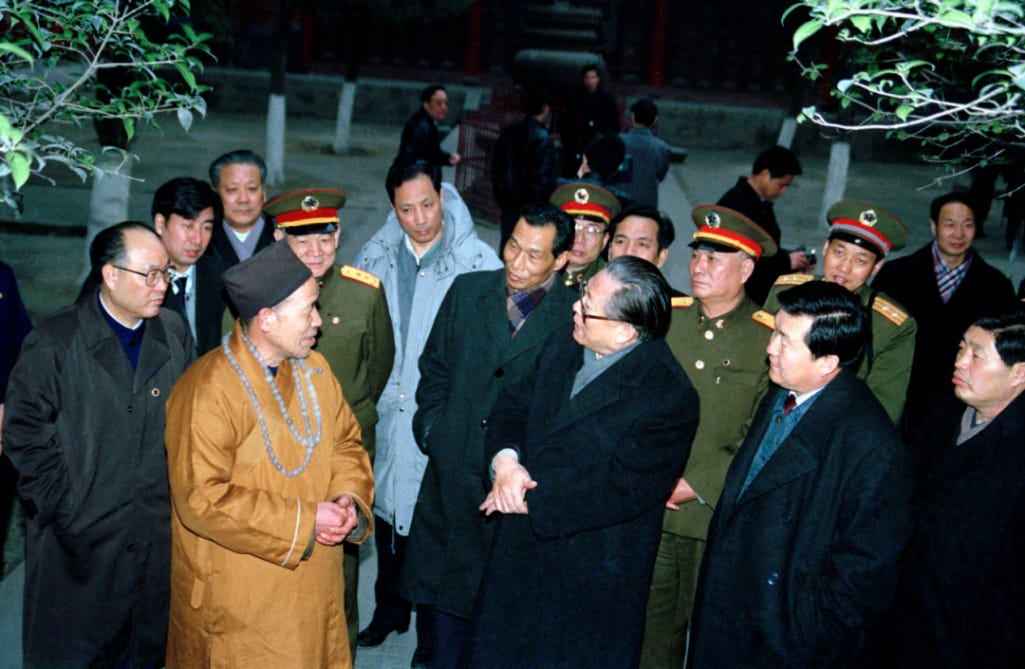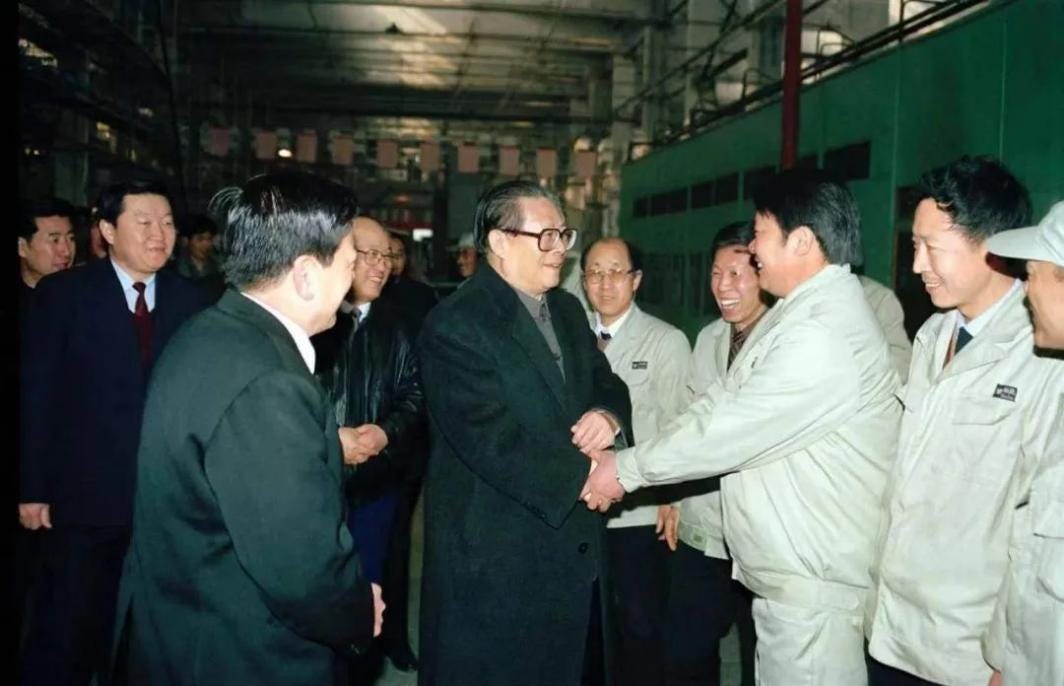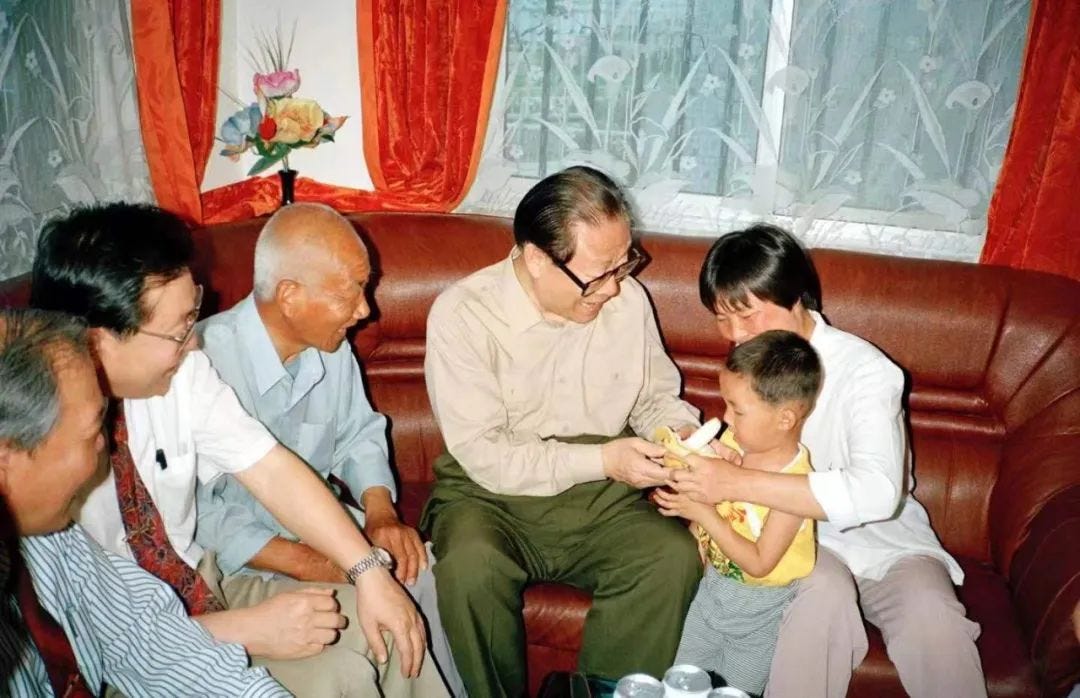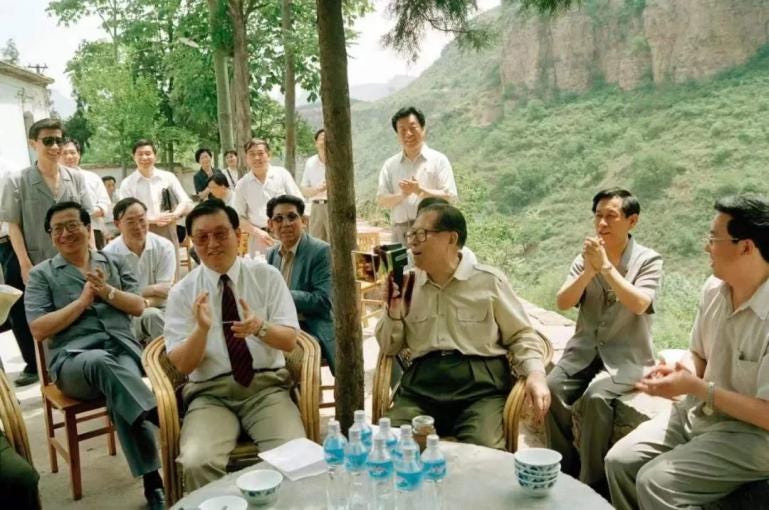An unexpected conversation between Jiang Zemin and a Buddhist monk 3 decades ago
And how a journalist managed to get the story published.
Compared to a few weeks ago, there have been so many interesting articles posted on the WeChat platform that Ginger River doesn't even have time to read them all. He will do his best to share some of them with you here.
Today's story is about an unexpected conversation three decades ago between a young Buddhist monk and Jiang Zemin, who passed away in Shanghai on Nov. 30 at the age of 96. Jiang was cremated on Dec. 5 in Beijing. The ashes of Jiang were scattered into the sea at the estuary of the Yangtze River on Sunday, in accordance with the wishes of Jiang himself and his family.
The first part of today's piece is a story written by Zhao Derun, a veteran Xinhua journalist who covered Jiang's conversation with a young Buddhist monk named Yinzhong at the White Horse Temple in Luoyang City in central China's Henan Province on Feb. 8, 1991.
The second part is Zhao Derun’s notes about the circumstances in which he wrote the story and how he managed to get the story published.
Zhao Derun is a member of the China Central Institute for Culture and History, former chief of Xinhua News Agency’s Henan branch, and deputy editor-in-chief of Guangming Daily.
Jiang inspected Henan in February 1991, June 1996, and June 1999. During the three inspection tours, Zhao accompanied Jiang for interviews. While reporting on the inspection trips, Zhao kept a wealth of data, including text and pictures.
As Chinese people mourned the passing of Jiang, Zhao thought about the story he wrote 31 years ago, General Secretary Meets with a Young Monk 总书记晤见小和尚. Zhao believed the philosophy in the wide-ranging, profound conversation still resonates today. The story and Zhao's notes were reposted on the WeChat account of Cover China 封面中国 on Dec. 1.
Part 1
General Secretary Meets with a Young Monk
By Zhao Derun in 1991
Spring showers drizzled down in Luoyang, the ancient capital of multiple dynasties.
On the afternoon of Feb. 8, after finishing a symposium with managers of large- and medium-sized enterprises, Jiang Zemin paid a visit to the White Horse Temple in the east of Luoyang City, accompanied by Hou Zongbin 侯宗宾, secretary of Henan Provincial Party Committee, and Li Changchun 李长春, governor of Henan Province. Established in the 11th year of the Yongping reign during the Eastern Han Dynasty (in 68 A.D.), the White Horse Temple has a history of more than 1,900 years, and it was the first Buddhist temple in China.
Jiang Zemin visited the White Horse Temple in Luoyang City, central China's Henan Province, Feb. 8, 1991. [Photo: Xinhua/Zhao Derun]
Guided by Yinshan, the head of the monastery, Jiang and his entourage visited historic sites in the temple, including the Sui Tablet, on which the inscriptions recorded the temple’s history, the Hall of Jade Buddha, the Hall of Heavenly Kings, and the Hall of Greetings. They also went to the Qingliang Terrace, where Emperor Ming studied when he was young and two eminent monks from India translated sutras.
As they walked, Jiang talked with monks about the history of Buddhism and Buddhist teachings. He stopped before two couplets. One said "大肚能容容天下难容之事,慈颜常笑笑世间可笑之人," a heart big enough to take in the hardships in the world, a Buddha kind enough to simile at the laughable on the earth. [The couplet is used to describe Maitreya, the benevolent one in Buddhism.] And the other one wrote "天雨虽宽不润无根之草,佛门广大难度不善之人," abundant rain cannot nurture grass without roots, Buddhism cannot save people without kindness. Jiang asked officials to note them down.
At the invitation of Yinshan, Jiang and his entourage walked into the guest hall to have a rest.
As they sat down, a young monk named Yinzhong brought in some tea. Jiang cordially asked him to sit down and began a conversation with him.
"What's your (original) name?"
"Tao Cuizhong (陶名翠) ."
"How old are you? And where are you from?"
"I'm 24 years old. I come from Guiyang City in Guizhou Province."
"It's a long way from Guizhou to Henan, and you're so young. Could you tell me why you converted to Buddhism?" asked Jiang kindly.
Monk Yinzhong hesitated to answer. Then Jiang encouraged him, saying, "That's all right. Let's talk freely. If you have any frustrations and disappointments in your life, please tell me."
Yinzhong finally said what was on his mind due to Jiang's kind attitude. He was born in a happy family. His father was a cadre in the government and his mother was a blue-collar worker. After graduating from a secondary vocational school, he was assigned to work in the capital city Guiyang.
"I liked my job and wanted to do something good for the people. But later, when I saw the corruption and malpractices in society, it was disappointing. I didn't want to join them, but I couldn't fight back either. So I often felt lost. Finally, I came to the temple last year to search for some spiritual release."
Jiang became very solemn on hearing this. Looking around, he said seriously, "An old poem goes that '若问古今兴废事,请君只看洛阳城' if you want to know how a nation rose and fell, please look at Luoyang. Luoyang used to be the capital of nine ancient Chinese dynasties. So the rise and fall of Luoyang is the epitome of the fate of China's feudal dynasties.
Every dynasty in China's history struggled to fight corruption. What is loyal? And what is evil? Serving the people is loyal while corruption is evil. We should be particularly vigilant about those who 'speak good words but do bad deeds', or double-dealers."
"The purpose of the Communist Party of China (CPC) is serving the people wholeheartedly," Jiang continued, "the Party has always been resolutely fighting against corruption. Before the founding of New China in 1949, Comrade Mao Zedong put forward '两个务必' 'Two Musts' [The comrades must remain modest, prudent and free from arrogance and rashness in the work style. The comrades must preserve the spirit of hard working] at the Second Plenary Session of the Seventh CPC Central Committee. Mao had warned us to watch out for the attacks with sugar-coated bullets. 《甲申三百年祭》In Honor of the Tercentenary of Li Zicheng’s Rebellion by Mr. Guo Moruo offered us a similar lesson. History tells us that if the anti-corruption fails, there will be no hope of building socialism with Chinese characteristics."
Then Jiang said to Yinzhong earnestly, "It is true that corruption and malpractices are taking place in the Party and society. But please believe that CPC has the resolve and the ability to combat corruption. I can't interfere with your personal choice. But converting to Buddhism doesn't solve the problems in your hometown. Please have faith in the Party and the government. We will fight firmly against corruption and malpractices.”
Yinzhong was cheered up, and he asked tentatively, "Should we recognize the value of Buddhism, which is one of the oldest religions in the world?"
Jiang said, "Besides Buddhism, there is also Taoism, Protestantism, Catholicism, and Islam in China. China's Constitution stipulates that citizens enjoy the freedom of religious belief. The Party and the government also train people to be in charge of religious work.
The world has a vast accumulation of knowledge. It takes a long time for a religion to form, and religions have storied cultures. My hometown Yangzhou is an ancient city with rich culture. I read Master Su Manshu's works in my teen days [Su Manshu is a Chinese writer, poet and also a Buddhist monk]. And I can still recite some beautiful poems he wrote. I also listened to hymns to Mother Mary. The music was melodious.
The Party is atheist, while China's Constitution says citizens enjoy the freedom of religious belief. The two are not contradictory. Some say we regard religions as heresy. But they are wrong. In China, people have the freedom of religious belief, and we also have the freedom to advocate atheism. We won't allow hostile forces at home and abroad to infiltrate China and carry out peaceful evolution through religions. This is our point of view. Do you agree?”
Yinzhong nodded with satisfaction.
After a brief pause, Jiang further emphasized, "Although there are essential differences between believing in communism and believing in religions, we all love our great Chinese people and our socialist country. China has a long history and a splendid culture. Though we fell behind in modern times, we can build our country well if the whole nation is united. We must do good things for the people, and the Party is aimed at serving the people. I believe if we're united under patriotism, we will do things right in China. I guess you also agree with this?"
"I totally agree!" Yinzhong smiled and said gladly. His reply livened up the atmosphere in the hall.
It was a conversation between the CPC general secretary and a young monk that chose Buddhism due to confusion about society, a cordial and gentle conversation between China's top leader and common people.
As it was getting late, Jiang was about to leave. Yinzhong and other monks walked Jiang to the gate of the monastery and said goodbye reluctantly. As the car drove far from the monastery, Jiang was still pondering over the conversation. He repeatedly said to cadres next to him, " We must pay attention to the talk today, and we must improve integrity in the government."
Part 2
Zhao Derun recalled the circumstances in which he wrote the story on Jiang's conversation with the young monk and how he managed to get the story published:
History has always been testing and developing the truth, and the great truth will never dim as time goes by.
As another spring is just around the corner, I can't help but think about the unforgettable reporting experience in my life in February 1991, the wide-ranging, profound, and philosophical conversation between Jiang Zemin and a young monk at the White Horse Temple in Luoyang City.
Comrade Jiang Zemin visited the home of a local resident in Kaifeng City, Central China’s Henan Province, June 1999. [Photo: Xinhua/Zhao Derun]
[GRR’s notes: Certain contents were redacted here because the information is covered in Part One above]
Jiang and his entourage arrived in Luoyang on the evening of Feb. 6. The next day, Jiang inspected the Luoyang Refinery, the Xiaolangdi Reservoir Dam on the Yellow River, the Luoyang First Tractor Factory, the Luoyang Glass Factory, the People's Liberation Army Foreign Languages Institute, and a high-tech research center. On the morning of Feb. 8, in a small conference room of the Friendship Hotel where he stayed, Jiang held a symposium on deepening enterprise reforms with dozens of managers and factory owners from Henan.
Comrade Jiang Zemin inspected Henan Xinfei Electronic Factory in Xinxiang City, Central China's Henan Province, February 1991. [Photo: Xinhua/Zhao Derun]
On the afternoon of Feb. 8, spring rain was drizzling. Officials of Henan Province suggested Jiang take a break and visit the White Horse Temple in the east of Luoyang. First built in the 11th year of the Yongping reign during the Eastern Han Dynasty, the White Horse Temple has a history of more than 1,900 years. It is the first Buddhist temple in China. Guided by Yinshan, the head monk of the monastery, Jiang and his entourage visited the Sui Tablet with inscriptions about the temple's history, the Hall of Jade Buddha, and the Hall of Greetings. They also went to the Qingliang Terrace, the place where Emperor Ming studied when he was young and where two eminent monks from India, Kāśyapamātanga and Dharmaratna, translated sutras.
Then the planned visit was over. Jiang walked to the gate and waved genially to the passing tourists. Later, Monk Yinshan invited Jiang to the guest hall to have a rest.
The rest was not included in the plan. After the interview, I heard that before Jiang came to the monastery, officials had asked other monks to stay in the Qiyun Pagoda next to the White Horse Temple until Jiang left. But later, as the plan was changed, they were called back in a rush. After Jiang and other officials went to the guest hall, the head monk asked a young monk to bring in some tea.
Despite his busy schedule, Jiang didn't look tired at all. When he noticed the monk offering the tea was very young, he asked about the monk's hometown, his age, and why he had chosen Buddhism with a friendly tone. No one had anticipated that the small talk would lead to a surprising answer. [As mentioned in Part One]
Yinzhong's words froze the atmosphere. No one could imagine that the young monk would choose such a heavy topic and lay out corruption and malpractices in front of Comrade Jiang. But Jiang did not shun the sensitive social issue, nor did he blame Yinzhong.
[Some contents are redacted here because the conversation is covered above.]
Jiang's words were enlightening for everyone present. The young monk also smiled. To everyone's surprise, the young monk took a step forward and raised another sensitive question: "Should we recognize the value of Buddhism, which is one of the oldest religions in the world?"
Comrade Jiang Zemin visited the home of a local farmer in Jiaozuo City, Central China’s Henan Province, June 1996. [Photo: Xinhua/Zhao Derun]
[Part of the conversation is redacted here. You may find the complete conversation in Part One above.]
The leader and a common person had such a sincere and heart-to-heart conversation. After Jiang said goodbye to the monks and left, I stayed behind and observed the monks' reactions. The young monk smiled and clasped his hands together. He kept saying "Amitabha. That was so good!"
Although the conversation was wonderful, officials have told me not to take notes, photos, or write a report because the topics were sensitive. After wrapping up the reports on Jiang's inspection tour to Henan, I suddenly received a telegram from my family and learned that my father had passed away. So I took the train home in a hurry, and my mind was disturbed all at once. But the conversation between Comrade Jiang and the young monk kept lingering in my head. I would regret it if I didn't make this into a report.
At that time, Wang Qin, former chief of Xinhua News Agency's Hebei branch, and his wife came to Henan. When they knew my idea, they encouraged me not to miss the good opportunity and write the news report right away. They also hoped the report could be published in the《乡音》Xiang Yin, the magazine they launched. Based on my vivid memory and other materials I collected after the Jiang's inspection, I worked late into the night and wrote《总书记晤见小和尚》Chat Between Jiang Zemin and a Young Monk. In a realistic manner, I recreated the situation and content of the conversation.
Comrade Jiang Zemin led others to sing the revolutionary battle song We're on the Taihang Mountains in Linzhou City, Central China's Henan Province, June 1996. [Photo: Xinhua/Zhao Derun]
When the writing is done, how to publish it? I remembered when Jiang came to inspect Henan, an official with the General Office of the CPC Central Committee had given me advice about the reports, Xinhua News Agency could release a report on the whole event, and I could send other stories such as features to Outlook Weekly, a weekly publication by Xinhua News Agency. So I sent the piece to Outlook Weekly and Xiang Yin respectively and told Wang that the report must be finalized by Outlook Weekly. When the article was sent to the editorial office of Outlook Weekly, the then Editor-in-chief Chen Dabin was satisfied with it. After some tweaks, he sent the piece to Jiang with a note:
Comrade Jiang,
A reporter with Xinhua News Agency's Henan branch wrote the article Chat Between Jiang Zemin and a Young Monk. We believe the article exhibits not only the Party's resolve to combat corruption but also the Party's stance on religion, which would be very informative to the readers. We plan to publish the article in Outlook Weekly. Here we present you the piece for review.
At that time, Jiang was preparing to visit the Soviet Union and didn't have time to read the article, so the publication was tabled. After he returned to Beijing from the Soviet Union, Jiang reviewed the article and sent it back to the editorial office of Outlook Weekly with a few changes in wording. Outlook Weekly published the piece as a feature article in its domestic and overseas editions simultaneously. The title in the domestic version was General Secretary met with a young monk, and the one in the overseas version was The conversation Jiang Zemin had in a Buddhist temple.
The article immediately drew much attention at home and abroad. Xiang Yin published the article at the same time as Outlook Weekly. Beijing Daily, Luoyang Daily, Zhengzhou Evening News, and Wenzhaibao (News Digest) then republished the article one after another. It was also reprinted in whole or in part in important columns of media outlets including《文汇报》Wen Wei Po, Ta Kung Pao《大公报》, 《明报》Ming Pao, and 《信报》Hong Kong Economic Journal in Hong Kong; 《澳门日报》Macao Daily News in Macao; and China Times《中国时报》, 《联合报》United Daily News, and 《台湾时报》Taiwan Times in Taiwan. Many Chinese newspapers in Southeast Asia also republished the article, such as 《中华日报》Chinese Daily News and《星暹日报》The Sing Sian Yer Pao Daily News in Thailand and 《世界日报》World News in the Philippines.
While reprinting the article as important news on the second page, Ming Pao added three lines on top:
江泽民与小和尚谈心
总书记慨言历代忠奸
共产党有决心也有能力惩治腐败
A heart-to-heart talk between Jiang Zemin and a Young Buddhist Monk
General Secretary talked about loyal and evil in China's history
The Communist Party of China has the resolve and the ability to combat corruption
Later, Ming Pao published an editorial on the article. Ming Pao was influential both in Hongkong and overseas. They usually put advertisements on the front page, important news on the second page, news about Hong Kong on the third to fifth pages, and news about China's mainland on the sixth and seventh pages. But this time, the newspaper was so generous. They put my report on the page reserved for important news and issued an editorial alongside it.
The article was also a big influence in religious groups. Zhao Puchu 赵朴初, president of the Buddhist Association of China, spoke highly of the article. Zhao once met with Monk Yinzhong, and the two had a cordial talk. Back in the 1930s, when General Feng Yuxiang 冯玉祥 governed Henan Province, he expelled Buddhist monks from the Daxiangguo Temple in Kaifeng and turned the temple into a venue for entertainment. Zhao and other big names in the Buddhist circle have been advocating that the Daxiangguo Temple should be given back to the religious circle.
Citing Jiang's remarks about the Party's policy on religion at the White Horse Temple, Zhao submitted a written statement to the central administration. Through multiple efforts, the Daxiangguo Temple was given back to religious people. A renowned temple on Mount Emei in southwest China's Sichuan Province even transcribed the report with Chinese calligraphy and framed it to show the visitors. When Zhang Wanxiang, former deputy editor-in-chief of Xinhua News Agency, visited the temple, he took a photo of it for me as a souvenir.
Indeed, there were also negative responses. After the article was published, the Municipal Party Committee of Guiyang sent someone to the editorial office of Outlook Weekly, asking Editor-in-chief Chen Dabin for an explanation: "Corruption is ubiquitous across the country, so why did the newspaper pick Guiyang? Why didn't they contact Guiyang when writing such a big report?"
Chen smiled, saying, "We don't think it's necessary to ask for your permission, since the article has been approved by the central administration." Ironically, before long, a big corruption case that shocked the whole country was revealed in Guiyang, the capital city of Guizhou Province.
In 1992, the article won the second prize in the China News Awards, and was included in Xinhua News Agency's collection of prose-style works by young journalists. Later, journalism departments of several universities put the article in their textbooks.
Comrade Jiang Zemin talked with children during an inspection tour of Central China's Henan Province, February 1991. [Photo: Xinhua/Zhao Derun]
I believe that a mature journalist should have the insight, judgment and courage like a politician does when facing critical political and social issues.
Reporting a talk between Jiang and a young monk is more difficult to handle than reporting Party and state leaders meeting with workers, farmers, intellectuals, or work models. Besides, the conversation touched on two sensitive topics, corruption and religion.
Before I wrote the article, someone asked me why I had to choose the conversation with the young monk, considering Jiang had met so many Party cadres, entrepreneurs, and local residents during his trip to Henan. When I picked a sensitive topic like this, people also asked me if I worried that the article would backfire, causing negative social responses and hurting the image of Party leaders.
In fact, from a dialectical materialism perspective, the talk was a once-in-a-lifetime opportunity. If we dared to touch on sensitive social issues and handled the writing delicately, we could write a report with wide social influence. The report would show the people that Jiang was knowledgeable and approachable, thus the report would enhance the prestige of the Party and Party leaders.
Three lines at the top added by Ming Pao when they reprinted the article also proved my point. When facing news topics like this, we should be meticulous, but not too meticulous to tie our hands and lose the opportunity entirely.
Please note that GRR’s articles do not represent any official document or views, as this is just a personal newsletter. If you find any errors, please send me an email: jjiang.sisu@hotmail.com.








